- Augusta University
- Instructional Innovation
- Speaking of Higher Ed...
Speaking of Higher Ed - Season 2
About The Podcast
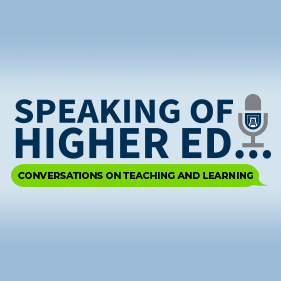 Speaking of Higher Ed exists to create a resource that will inspire and assist faculty
in creating engaging and meaningful learning experiences. We hope to provide higher
ed faculty with a platform for sharing research related to the scholarship of teaching
and learning, spark new instructional ideas, and promote interdisciplinary instructional
methods.
Speaking of Higher Ed exists to create a resource that will inspire and assist faculty
in creating engaging and meaningful learning experiences. We hope to provide higher
ed faculty with a platform for sharing research related to the scholarship of teaching
and learning, spark new instructional ideas, and promote interdisciplinary instructional
methods.
Contact Us
Speaking of Higher Ed Podcast
Use 'Podcast' in the subject line.
Season Two (Episodes 13 - 24) |
Episode 24: Level Up: Gamification and Game Based Learning in Higher Ed
December 18, 2024
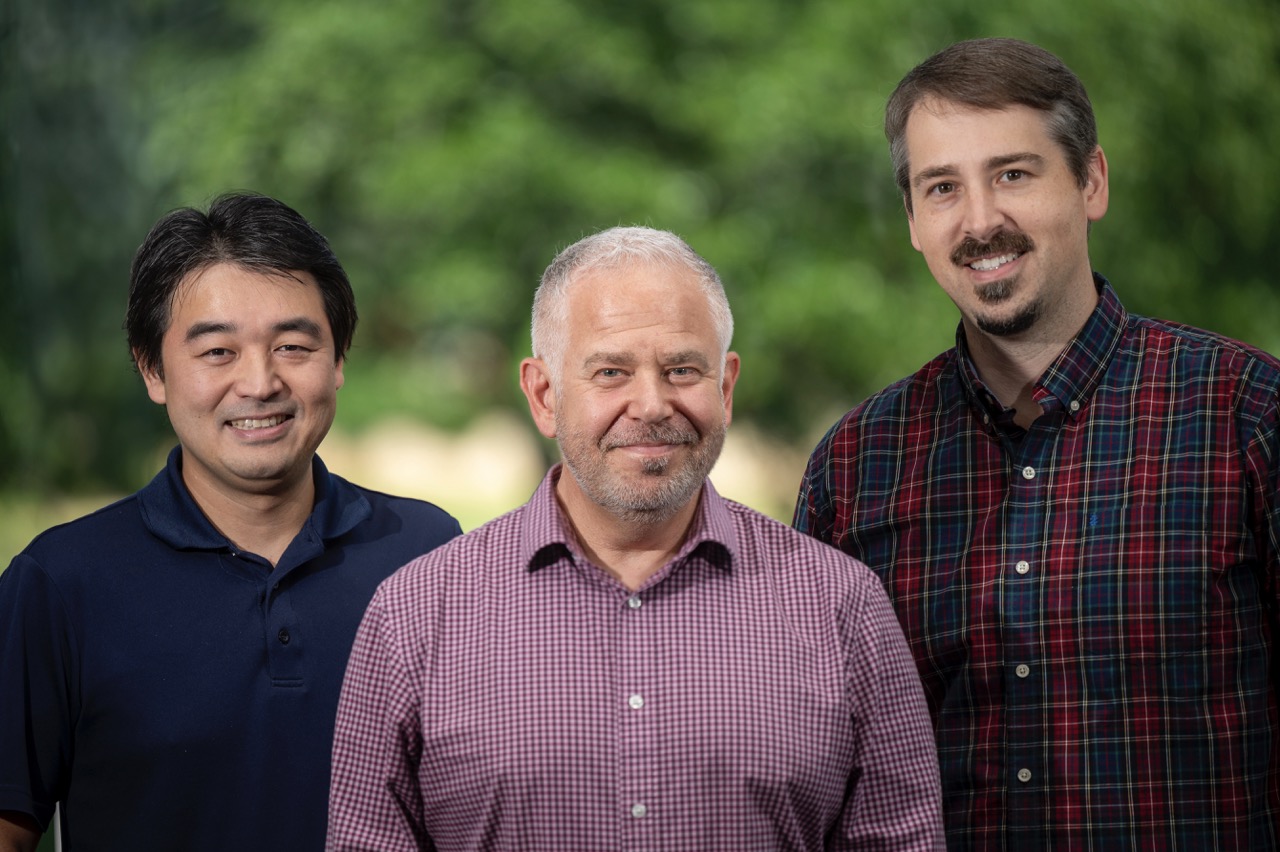 “Have you ever wondered if the principles of gaming could transform how your students
learn?” In this episode we explore gamification and game-based learning in higher
education with Jeff Mastromonico and Arthur Takahashi. You’ll hear about the differences between these approaches, how they can boost student
engagement, and practical examples like escape rooms and simulations. Discover how
you can incorporate gamified elements into your courses, align them with your teaching
objectives, and create more engaging learning experiences across any discipline.
“Have you ever wondered if the principles of gaming could transform how your students
learn?” In this episode we explore gamification and game-based learning in higher
education with Jeff Mastromonico and Arthur Takahashi. You’ll hear about the differences between these approaches, how they can boost student
engagement, and practical examples like escape rooms and simulations. Discover how
you can incorporate gamified elements into your courses, align them with your teaching
objectives, and create more engaging learning experiences across any discipline.
Resources mentioned in this episode:
Sententia Gamification provides training through ready-to-train programs and facilitator certifications, in addition to their custom development services.
The Center for Instructional Innovation collaborate with the CAHS Interprofessional Education committee to create an escape room as an interprofessional learning experience for nearly 150 students from various health programs to enhance teamwork, empathy, and problem-solving skills in patient care.
The Handbook of Game-Based Learning provides a comprehensive overview of the latest research on using computer games for learning and instruction. Grounded in psychological and learning sciences theory, it covers various perspectives and explores how game features can enhance educational effectiveness, making it a valuable resource for both practitioners and researchers.
Computer Games for Learning provides a comprehensive investigation into the educational value of computer games, examining research across three genres: the value-added approach, the cognitive consequences approach, and the media comparative approach. Written by Richard E. Mayer, a renowned educational psychologist at the University of California, Santa Barbara, the book includes examples of research, meta-analyses, and suggestions for future studies, making it essential reading for those interested in the educational effectiveness of computer games.
Episode 23: Feel, Think, Learn - Insights from social-affective neuroscience with Dr. Mary Helen Immordino-Yang
November 20, 2024
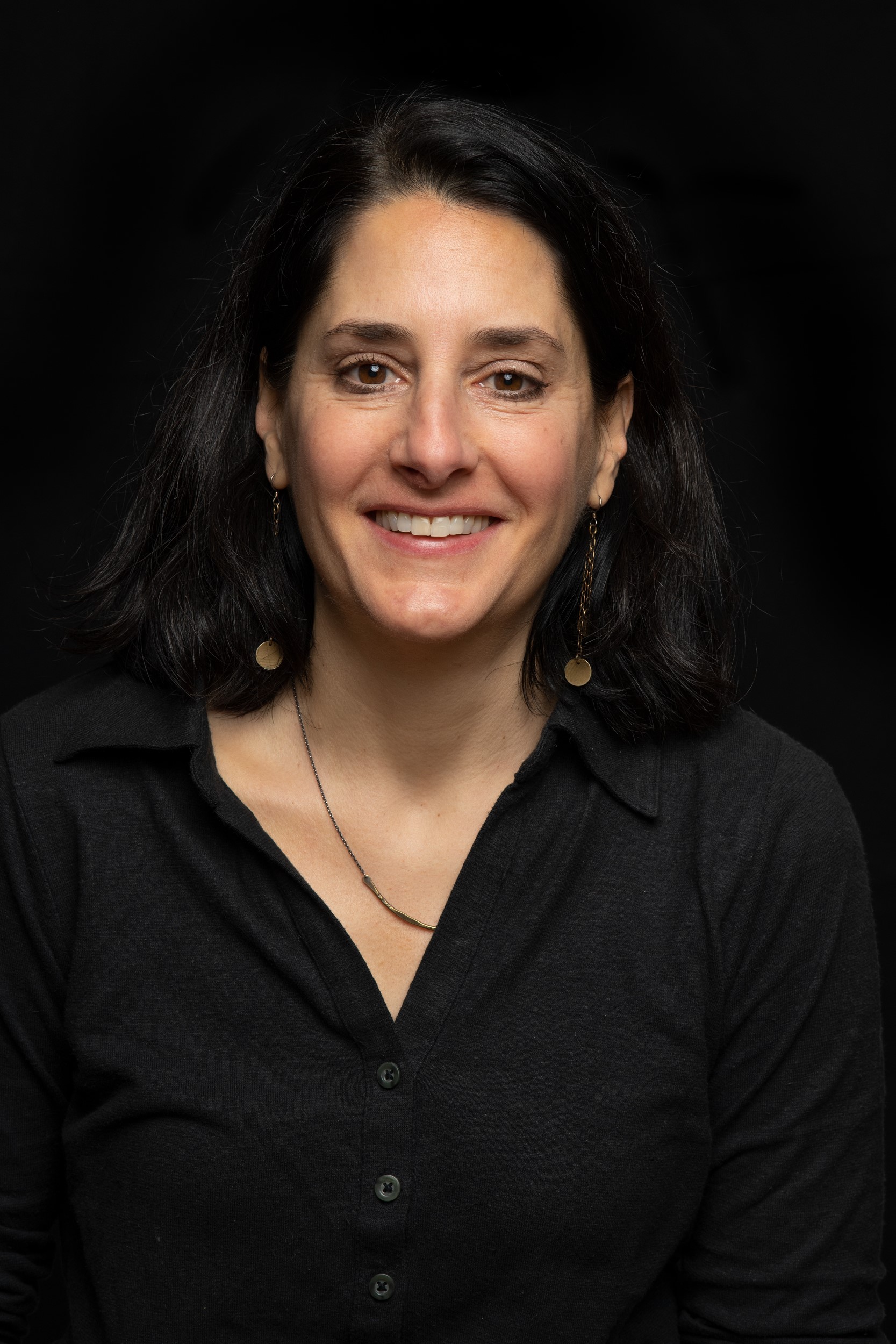 “There is no learning without emotion.” This bold statement, likely familiar to many
educators, is at the center of Dr. Mary Helen Immordino-Yang’s research. In this episode
of Speaking of Higher Ed, we speak with Dr. Immordino-Yang, a renowned professor of
education, psychology and neuroscience at the University of Southern California. We
explore why emotions are essential to learning from a neurobiological perspective,
how we can use this knowledge to help our students learn meaningfully, and what this
insight means for our approach to education.
“There is no learning without emotion.” This bold statement, likely familiar to many
educators, is at the center of Dr. Mary Helen Immordino-Yang’s research. In this episode
of Speaking of Higher Ed, we speak with Dr. Immordino-Yang, a renowned professor of
education, psychology and neuroscience at the University of Southern California. We
explore why emotions are essential to learning from a neurobiological perspective,
how we can use this knowledge to help our students learn meaningfully, and what this
insight means for our approach to education.
Resources mentioned in this episode:
- Learn more about the work happening at CANDLE and find links to publications by visiting their website.
- Dr. Immordino-Yang's book, Emotions, Learning, and the Brain, is available online.
- You can find Dr. Immordino-Yang's recent article, Civic reasoning depends on transcendent thinking: Implications of adolescent brain development for SEL online.
Episode 22: Dr. Richard E. Mayer - Insights on Revised Bloom's Taxonomy and Cognitive Theory of Multimedia Learning
October 16, 2024
 “How can you teach people in ways so that they can take what they’ve learned and use
it in new situations?” This question has been the driving force behind Dr. Richard E. Mayer's work for over 40 years. In this episode of Speaking of Higher Ed, we talk with Dr. Mayer, the world’s most cited educational psychologist, about two
of his most significant contributions to education: his involvement in revising Benjamin
Bloom's original taxonomy of educational objectives and his lifelong work in multimedia
learning.
“How can you teach people in ways so that they can take what they’ve learned and use
it in new situations?” This question has been the driving force behind Dr. Richard E. Mayer's work for over 40 years. In this episode of Speaking of Higher Ed, we talk with Dr. Mayer, the world’s most cited educational psychologist, about two
of his most significant contributions to education: his involvement in revising Benjamin
Bloom's original taxonomy of educational objectives and his lifelong work in multimedia
learning.
First, we explore his role in creating the Revised Bloom's Taxonomy. Dr. Mayer explains why the revised taxonomy is not yet a cumulative hierarchy, challenging the widespread misconception and cautioning us against the use of the pyramid visual. Instead, he explains which of the six categories of the Revised Bloom's Taxonomy we should focus on when designing instruction.
In the second part of the interview, Dr. Mayer discusses his groundbreaking work in multimedia learning, including his famous Cognitive Theory of Multimedia Learning. He shares how his research can help us design better instruction. Dr. Mayer also discusses the future of his research.
Resources mentioned in this episode:
Dr. Mayer's "Multimedia Learning, Third Edition" presents an evidence-based approach to educational design, outlining 15 principles of multimedia instruction derived from extensive research and grounded in the Cognitive Theory of Multimedia Learning, offering insights into how people effectively learn from combined textual and graphical content.
The book "A Taxonomy for Learning, Teaching, and Assessing: A Revision of Bloom's Taxonomy of Educational Objectives" presents a two-dimensional framework based on Bloom's Taxonomy, focusing on knowledge and cognitive processes, to help educators implement standards-based curricula and align educational goals, instruction, and assessment for more effective teaching and learning.
In the article, “Rote Versus Meaningful Learning,” Dr. Mayer explores the distinction between rote and meaningful learning, explaining how the revised Bloom's Taxonomy can be used to promote deeper understanding and knowledge transfer in educational settings.
In the article, “The Past, Present, and Future of the Cognitive Theory of Multimedia Learning,” Dr. Mayer reviews the cognitive theory of multimedia learning, tracing its development over 40 years, explaining its core principles, and discussing its implications for educational design and practice.
Episode 21: Student Engagement Strategies with Gary T. Green, EdD
September 18, 2024
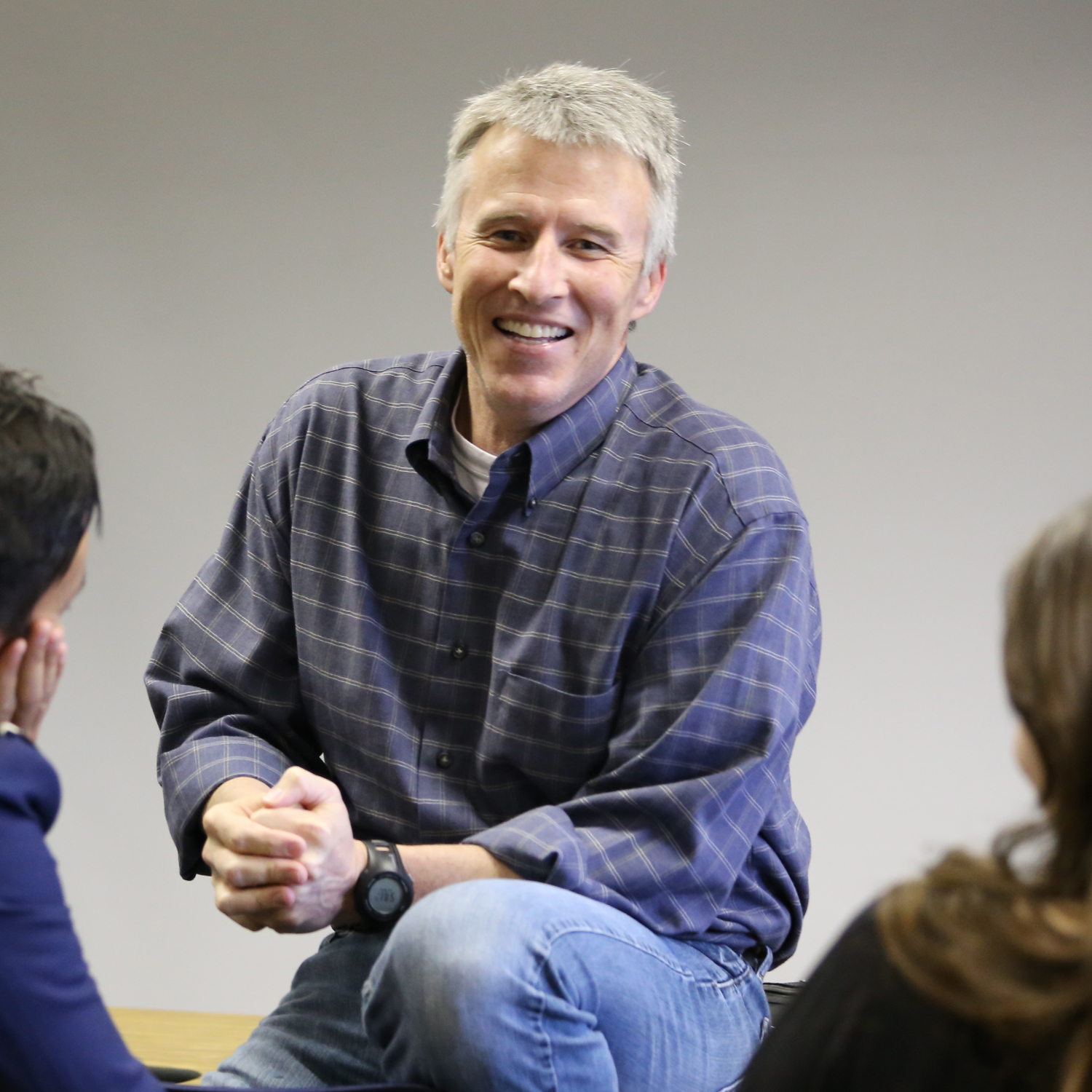 What happens when a professor throws paper balls and playlists into the mix to get
students engaged? In this episode of Speaking of Higher Ed, Gary Green, EdD from the University of Georgia shares how he uses unconventional, yet effective,
strategies to capture student attention and keep them involved. Dr. Green explains
his approach to fostering a classroom environment that encourages active participation.
He shares specific techniques such as using paper ball activities, personalized music
playlists, and creative tools like "Learn-dle" to make learning more engaging.
What happens when a professor throws paper balls and playlists into the mix to get
students engaged? In this episode of Speaking of Higher Ed, Gary Green, EdD from the University of Georgia shares how he uses unconventional, yet effective,
strategies to capture student attention and keep them involved. Dr. Green explains
his approach to fostering a classroom environment that encourages active participation.
He shares specific techniques such as using paper ball activities, personalized music
playlists, and creative tools like "Learn-dle" to make learning more engaging.
Dr. Green also emphasizes the importance of getting to know students on a personal level, integrating their interests into course materials, and maintaining open communication. By offering his phone number and responding quickly to student inquiries, he builds rapport and breaks down barriers between instructor and student.
Additionally, Dr. Green highlights the role of feedback in shaping his teaching, conducting regular check-ins to assess student understanding and adjusting his approach accordingly. He also touches on the use of group activities, creative exam reviews, and offering flexibility to students who may need extra support.
We discuss actionable strategies for educators looking to enhance student engagement in their classrooms, whether in large lectures or smaller classes.
If you would like to connect with Dr. Green, visit his UGA contact page.
Episode 20: Innovating experiential learning and community partnerships w/ Lynsey Steinberg
August 21, 2024
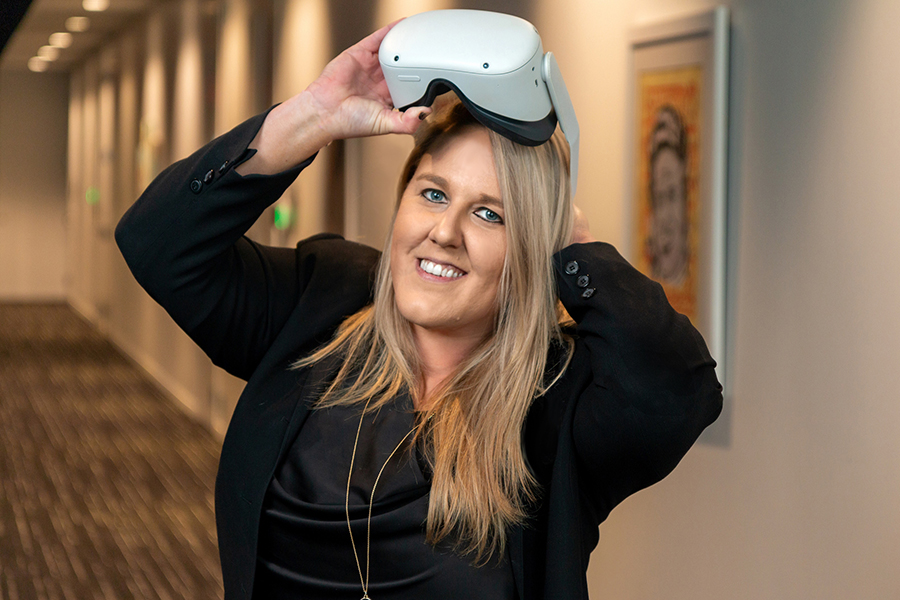 Discover how real-world experiences shape student success in our conversation with
Lynsey Steinberg, Director of Innovation at the Georgia Cyber Innovation and Training Center. She
offers practical tips for faculty on creating impactful community partnerships and
interdisciplinary projects, while also sharing the growth journey of the Innovate
Competition from 20 students to over 300 participants.
Discover how real-world experiences shape student success in our conversation with
Lynsey Steinberg, Director of Innovation at the Georgia Cyber Innovation and Training Center. She
offers practical tips for faculty on creating impactful community partnerships and
interdisciplinary projects, while also sharing the growth journey of the Innovate
Competition from 20 students to over 300 participants.
Resources mentioned in this episode:
Learn more about the Innovate competition by visiting the Innovation webpage.
July 17, 2024
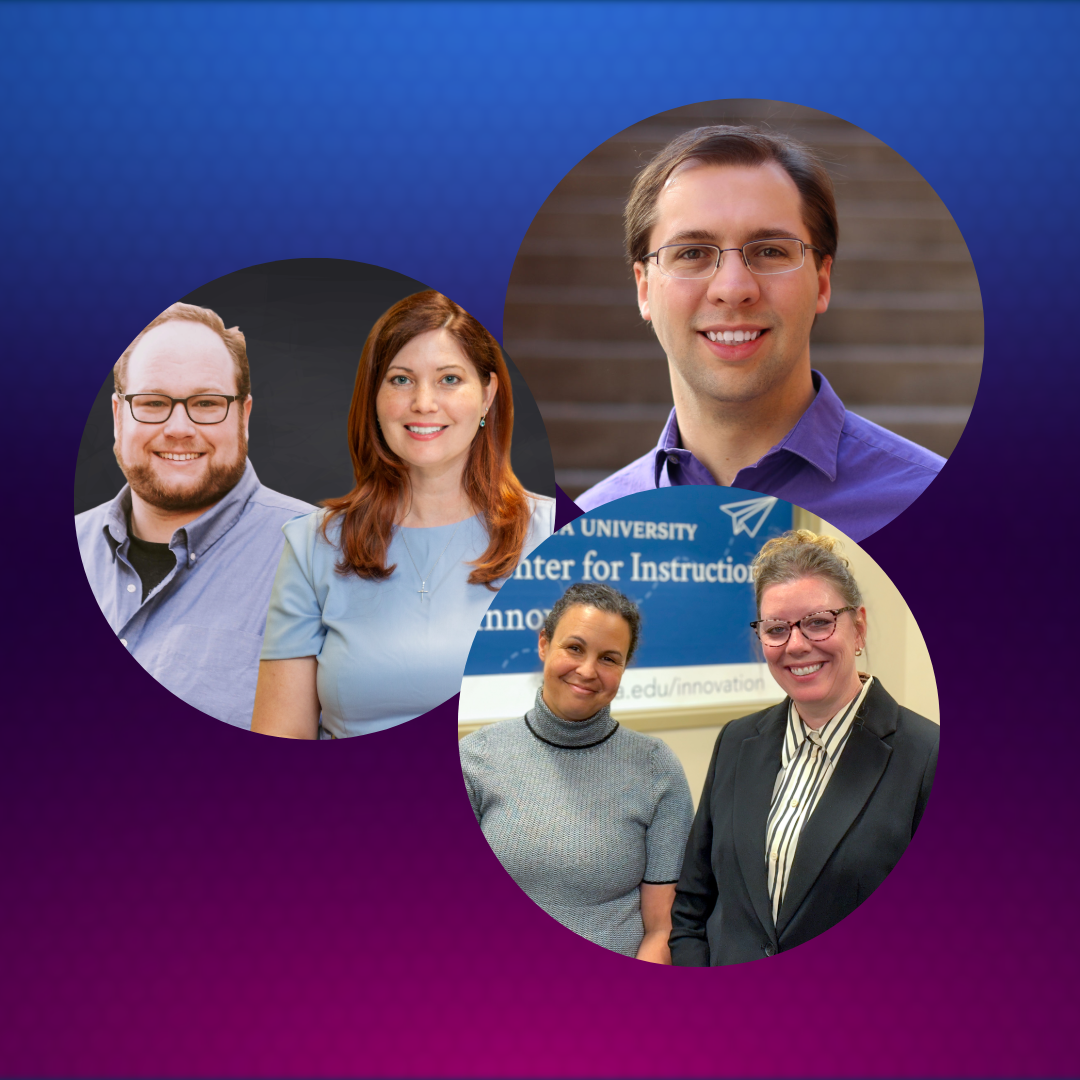 In this special summer shorts episode, we revisit conversations from the past year
to help you gear up for the upcoming semester. Join us as we explore practical strategies
and innovative approaches shared by our expert guests.
In this special summer shorts episode, we revisit conversations from the past year
to help you gear up for the upcoming semester. Join us as we explore practical strategies
and innovative approaches shared by our expert guests.
From episode 13, JoAnn Edmond and Jenn Rose kick things off by emphasizing the importance of a learner-centered syllabus. "Creating tools like a syllabus, which can serve as a blueprint for your course, is crucial," they explain. By utilizing templates and resources from the Center for Instructional Innovation, faculty can design syllabi that not only guide course structure but also foster a community-focused learning environment. This approach, they argue, can directly support institutional goals like improving student retention.
We explore the concept of Ungrading from episode 17 with Drs. Candis Bond and Trent Kays. They describe Ungrading as an "assessment and evaluation approach that favors process over traditional grading," focusing on formative assessment and continuous feedback. By shifting away from the conventional A-F scale, this method aims to enhance intrinsic motivation and promote a deeper engagement with the learning process. "It's a mindset, a philosophy," they assert, encouraging educators to create environments where students can focus on learning rather than merely aiming for a grade.
Finally, from episode 15, Dr. David Joyner discusses the transformative potential of AI in education. He highlights the need to adapt assessments to maintain their effectiveness in the face of new AI tools like ChatGPT. He advises, "We must make certain changes to keep our assessments reliable and effective demonstrations of student understanding." Dr. Joyner also sees AI as a means to elevate educational outcomes, enabling students to tackle more ambitious projects and achieve deeper understanding. His insights are complemented by his publication "A Teacher's Guide to Conversational AI" and a professional certificate program available on edX.
Episode 18: Summer Shorts: Hip-Hop, Grades and Good Teaching
June 19, 2024
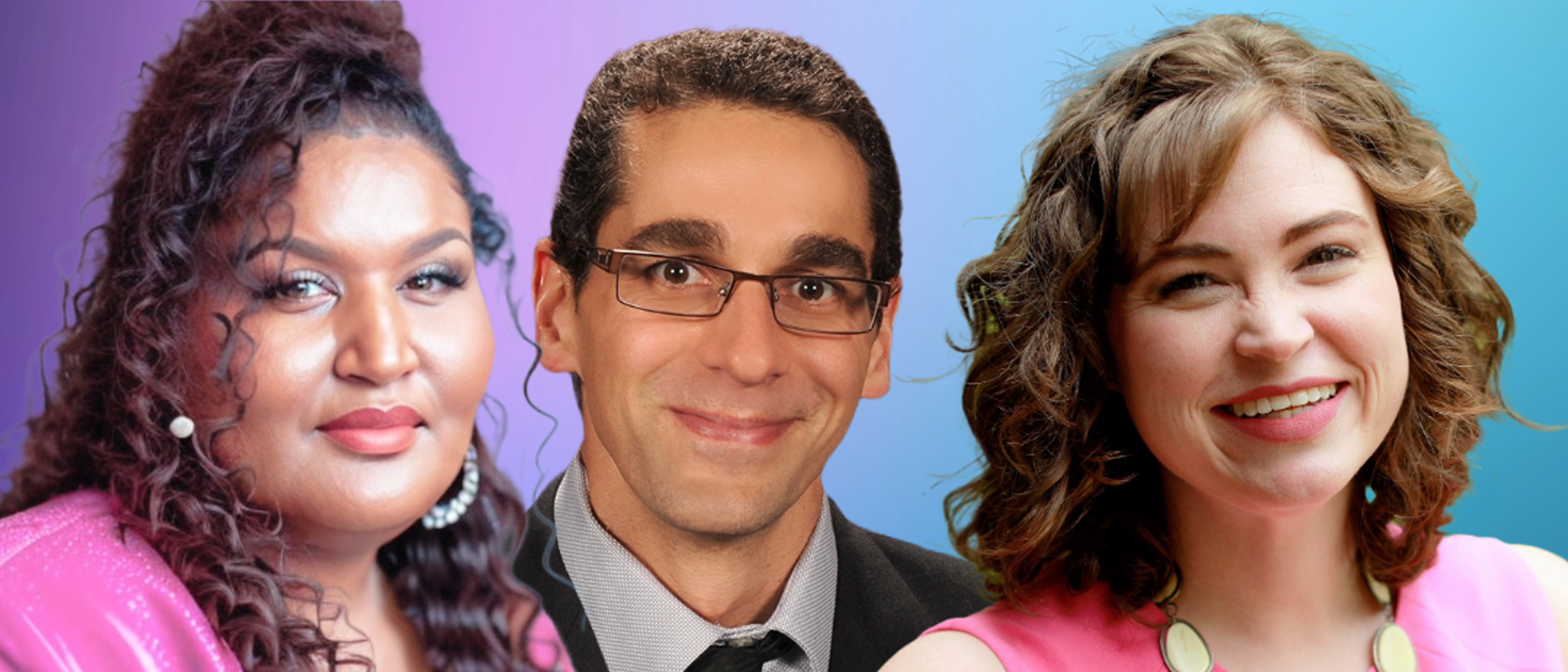 In our Summer Shorts episode for this month, we look back at some key moments from
the past year. We highlight transformative approaches in teaching and learning, including
hip-hop pedagogy, documenting effective teaching, and innovative grading practices.
In our Summer Shorts episode for this month, we look back at some key moments from
the past year. We highlight transformative approaches in teaching and learning, including
hip-hop pedagogy, documenting effective teaching, and innovative grading practices.
From episode nine, Dr. Lauren Barbeau from Georgia Tech discusses her publication on the Critical Teaching Behaviors framework, which provides a comprehensive system to identify and discuss good teaching, offering a common language across disciplines.
We talked with Dr. Dan Kaminstein of the Medical College of Georgia in episode eleven, who challenges traditional grading systems and advocates for alternative assessment strategies that promote continuous learning and student engagement.
Finally, from episode sixteen, we explore the world of hip-hop pedagogy with Dr. Kelly Allen from Augusta University, who demonstrates how integrating hip-hop culture into education can boost student motivation and academic success.
Episode 17: Ungrading with Drs. Candis Bond and Trent Kays
May 15, 2024
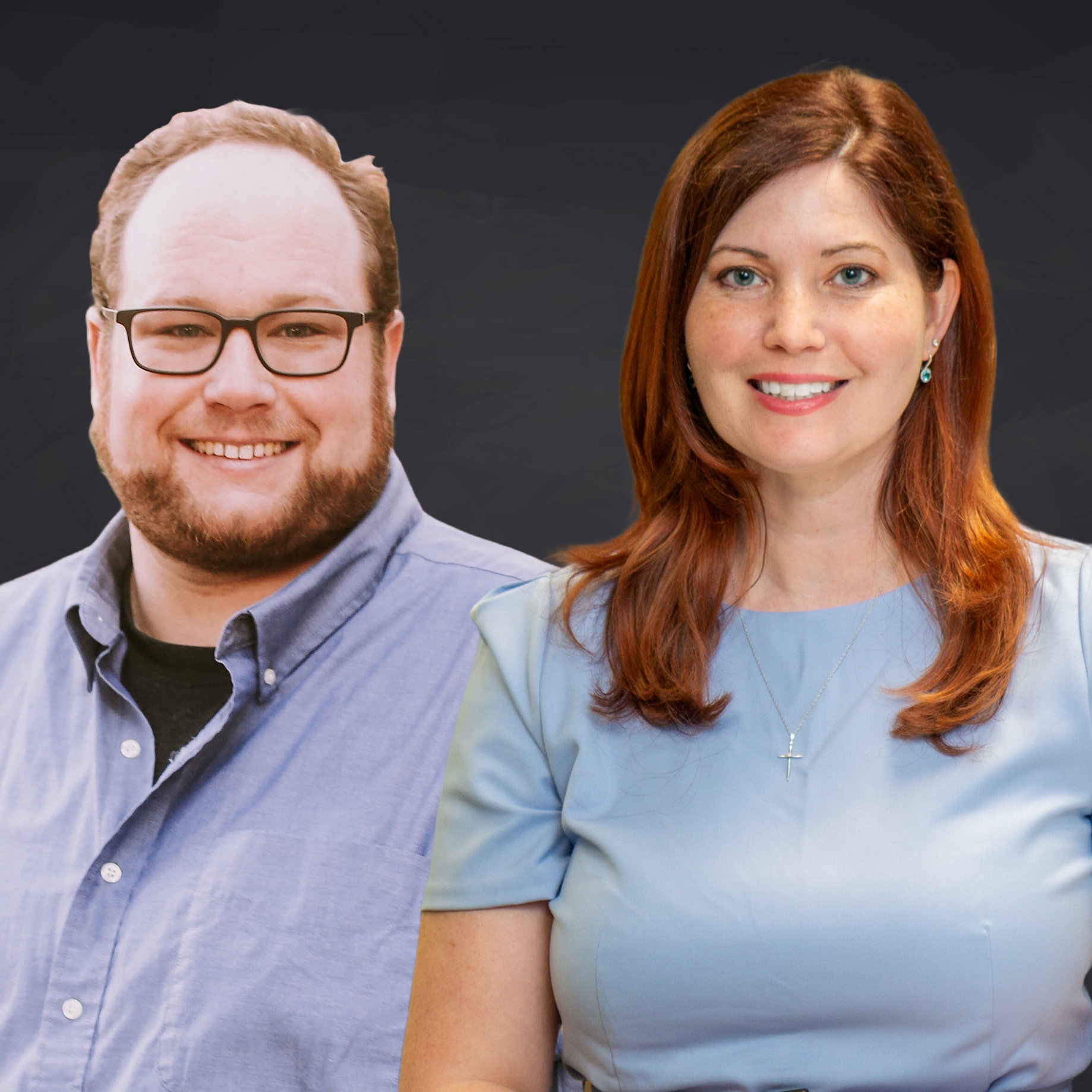 Have you ever felt that traditional grading methods fail to accurately measure student
learning?
Have you ever felt that traditional grading methods fail to accurately measure student
learning?
In this episode, we explore an innovative approach called "ungrading" that challenges the traditional grading system. Drs. Bond and Kays discuss how ungrading does not mean no grades. It means a shift in focus from grades to student autonomy and learning.
Ungrading can also help you highlight how mistakes, continuous feedback and revisions are crucial to your students’ learning process. We also explore how this approach can promote equity, increase student motivation and ultimately impact learning.
On this episode, Candis Bond, PhD, Director of the Center for Writing Excellence at Augusta University and Associate Professor of English, and Trent Kays, PhD, Director of College Composition and Assistant Professor of English, share their experiences ungrading their courses.
Resources mentioned in this episode:
If you are interested in learning more, Ungrading: Why Rating Students Undermines Learning, edited by Susan Blum provides insight from faculty across disciplines about the ungrading approach.
Episode 16: Hip-Hop Pedagogy with Kelly Allen, PhD
April 17, 2024
 What is Hip-Hop pedagogy? How can the use of Hip-Hop culture in curriculum engage
students and create relevant connections to course content?
What is Hip-Hop pedagogy? How can the use of Hip-Hop culture in curriculum engage
students and create relevant connections to course content?
Kelly R. Allen, PhD, is an Assistant Professor of Curriculum Studies in the College of Education and Human Development Department of Research, Counseling, and Curriculum at Augusta University and advocate for the implementation of Hip-Hop based education.
During Allen’s early years as a high school social studies teacher, she discovered the power of using Hip-Hop culture in her teaching. Seeing that it was “more than a hook”, but instead something to be infused in all aspects of her courses. Hip-hop culture has since been an integral part of her research and teaching.
Dr. Allen discusses the 5 aspects of Hip-Hop culture, describing how and why they allow students to engage, feel empowered and find relevance in course content. She discusses the past and current perceptions of Hip-Hop pedagogy in academia and how she sees it moving forward in the higher education space.
Dr. Allen concludes with tips and advice for practitioners on how to incorporate Hip-Hop pedagogy into their teaching.
Resources mentioned in this episode:
If you are interested in learning more about Dr. Allen and her work, you can connect with her on X (formerly Twitter). Her book, Teaching for Liberation: On Freedom Dreaming in the Field of Hip–Hop Education, is available online.
Episode 15: AI in Higher Ed with David Joyner, PhD
March 20, 2024
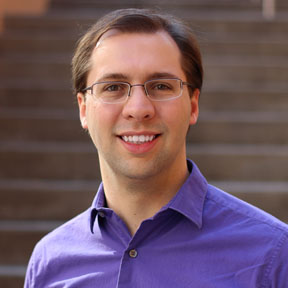 Should I discuss AI with my students? How can I benefit from using AI?
Should I discuss AI with my students? How can I benefit from using AI?
In this episode, David Joyner, PhD, joins us to explore how AI is transforming education, for students and educators. ChatGPT generated significant discussion when it launched in November 2022. Now, with more than a year of growing in understanding about generative AI, we are discovering what changes are necessary in the classroom.
Joyner provides valuable insights from his research and classroom experiences, addressing educators seeking basic knowledge about ChatGPT and those aiming to deepen their understanding of generative AI. Educators aren't the only ones adapting to technologies like ChatGPT; students are also adjusting. This technology holds the potential to facilitate faster learning and improvement in targeted areas. However, it may require adjustments to assessments to maintain the desired level of rigor in evaluating student mastery of the material.
We also discuss Joyner’s new publication, A Teacher’s Guide to Conversational AI, and the professional certificate program he developed, available on the edX online learning platform.
Resources mentioned in this episode:
If you are interested in learning more about David Joyner and his work, visit his website. To connect with him socially, visit his LinkedIn page. Joyner has also developed a professional certificate in ChatGPT for educators, available on the edX platform. If you are interested in learning more about his latest book, available April 2, visit the Books section of his website.
Episode 14: Connecting Community Engagement with the Classroom
February 21, 2024
 Are you a faculty member looking to collaborate with community organizations? By working
together, universities and community organizations can create mutually beneficial
relationships that enrich the educational experience, address community needs, and
contribute to positive societal outcomes.
Are you a faculty member looking to collaborate with community organizations? By working
together, universities and community organizations can create mutually beneficial
relationships that enrich the educational experience, address community needs, and
contribute to positive societal outcomes.
Achieving the Carnegie Community Engagement Classification is one of the aspirational imperatives included in the Augusta University strategic plan. Pursuing this elective classification involves extensive work documenting how the university is partnering with the Augusta community.
On this episode, Tina Baggott, Associate Vice President for Volunteer Services & Community Engagement at Augusta University, discusses the pursuit for this classification. She discusses its importance for higher education, available resources for faculty, and more.
Resources mentioned in this episode:
For more information about how you can begin community partnerships that align with your course, visit the Volunteer Services & Community Engagement webpage.
Episode 13: Jenn and JoAnn’s 5 tips for starting the semester strong
January 17, 2024
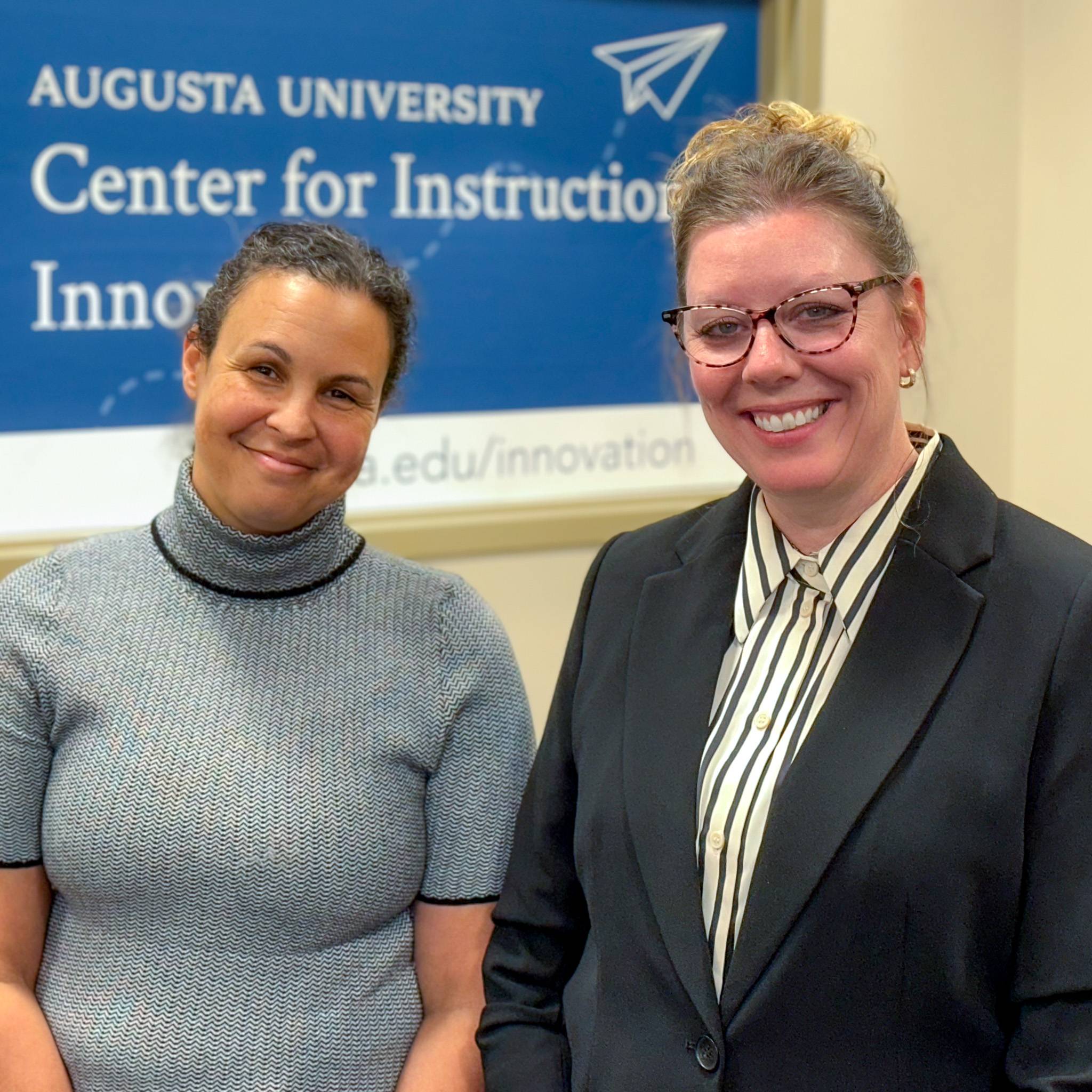 Every semester presents a mix of challenges and opportunities for both students and
faculty. In this episode, Jenn Rose and JoAnn Edmond share five practical tips to
help kick-start the semester on a strong note.
Every semester presents a mix of challenges and opportunities for both students and
faculty. In this episode, Jenn Rose and JoAnn Edmond share five practical tips to
help kick-start the semester on a strong note.
We discuss the importance of crafting a learner-centered syllabus and getting a jumpstart on integrating tools within the Learning Management System (LMS). Our conversation also touches on strategies for giving timely and meaningful feedback, with a focus on utilizing LMS tools for scheduled course communications.
Jenn and JoAnn highlight the usefulness of tools such as replace strings in personalizing messages for students, even when using a generic message for everyone. They also suggest considering the incorporation of rubrics in the LMS to clarify grading criteria and streamline the grading process. Rubrics can be used for assignments in online or face-to-face courses.
Joining us in this episode are JoAnn Edmond, Director of Instructional Support, and Jenn Rose, a Faculty and Instructional Developer, both from the Center for Instructional Innovation at Augusta University.
About the Hosts
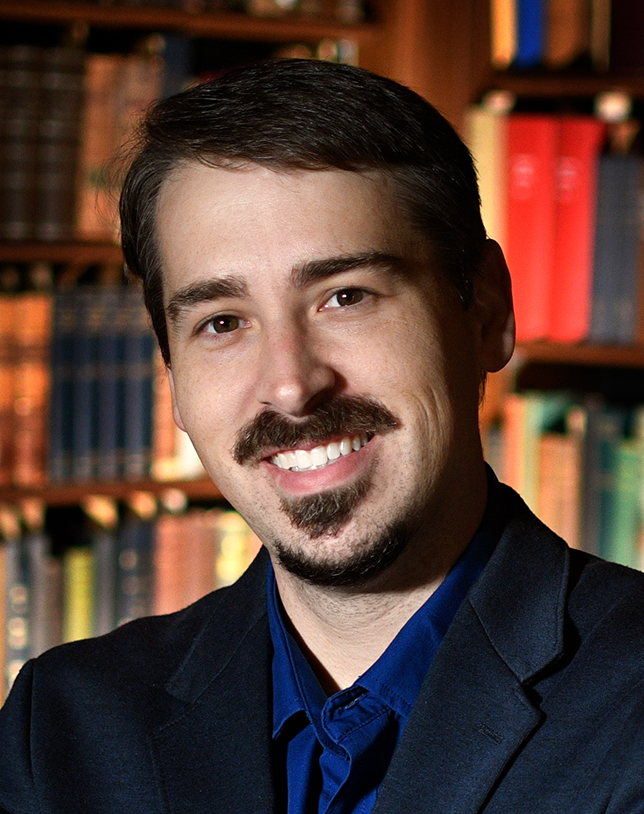 Andrew Everett is a Faculty & Instructional Developer in the Center for Instructional Innovation
(CII) with a focus on video and multimedia production and is the producer of Speaking of Higher Ed. Andrew is also an adjunct instructor in the Department of Social Sciences. After
nearly a decade in TV news, Andrew came to Augusta University in 2019 as a video producer
for Communications & Marketing before moving to the CII in 2022. Andrew has been awarded
numerous Georgia Associated Press awards, an EMMA award from the National Academy
of Television Arts & Sciences, and two silver Telly awards for his work on the short
film Augusta Gives: Back to the Future and for an educational video for physical therapy students. He also holds Sententia’s
Gamification Surveyor Certification (Level 1). Andrew earned a BS in Digital Cinematography
from Full Sail University and a Master of Public Administration degree from Augusta
University.
Andrew Everett is a Faculty & Instructional Developer in the Center for Instructional Innovation
(CII) with a focus on video and multimedia production and is the producer of Speaking of Higher Ed. Andrew is also an adjunct instructor in the Department of Social Sciences. After
nearly a decade in TV news, Andrew came to Augusta University in 2019 as a video producer
for Communications & Marketing before moving to the CII in 2022. Andrew has been awarded
numerous Georgia Associated Press awards, an EMMA award from the National Academy
of Television Arts & Sciences, and two silver Telly awards for his work on the short
film Augusta Gives: Back to the Future and for an educational video for physical therapy students. He also holds Sententia’s
Gamification Surveyor Certification (Level 1). Andrew earned a BS in Digital Cinematography
from Full Sail University and a Master of Public Administration degree from Augusta
University.
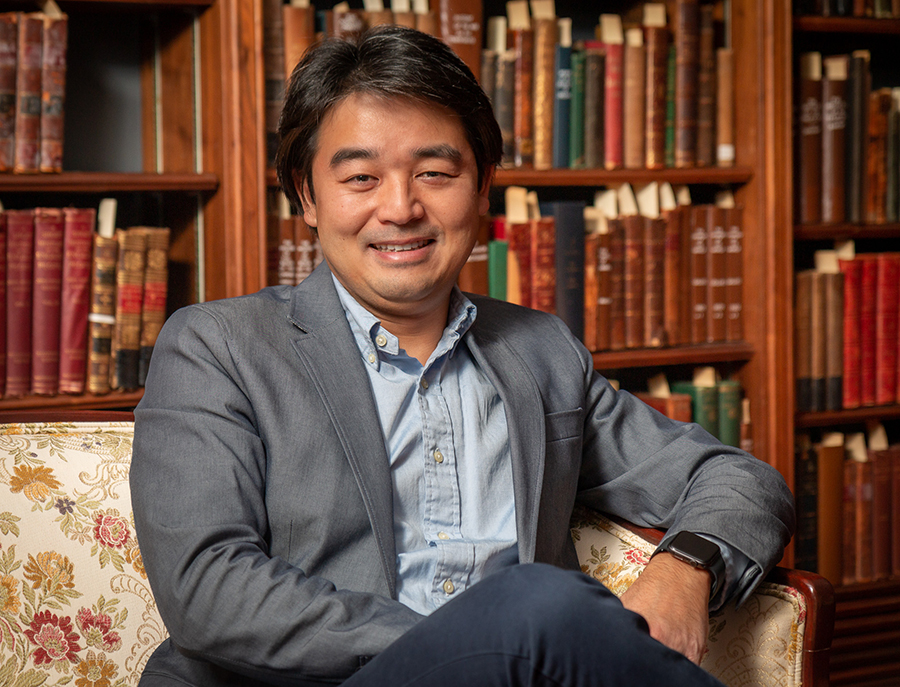 As a visual storyteller, Arthur Takahashi has worked in TV, public relations, and now instructional design. In his professional
career, he has seen how visuals can touch people, how stories can stick with them
for a lifetime and how shared emotional experiences can create a strong bond among
them. His work has led him to three Southeast Regional Emmy Awards nominations for
promo, documentary, and animation. He has also won a regional Edward R. Murrow Award
for hard news, two Georgia Association of Broadcasters awards for best locally-produced
program and best use of digital platforms, two Georgia Associated Press Awards for
investigative reporting and general reporting, a bronze Telly Award for documentary.
As an instructional designer, he also placed first at the 2021 Adobe eLearning Design
Awards and won a silver Telly for best use of 2D animation and a silver Telly for
an educational video in the health and safety category. Since Arthur joined CII, he
has helped create faculty development offerings that have impacted hundreds of AU
faculty. He holds the Sententia’s Gamification Surveyor Certification (Level 1) and
is a QM-certified APPQMR online facilitator. Arthur has a bachelor’s degree in mass
communication, a master’s degree in history and a master’s degree in public administration.
As a visual storyteller, Arthur Takahashi has worked in TV, public relations, and now instructional design. In his professional
career, he has seen how visuals can touch people, how stories can stick with them
for a lifetime and how shared emotional experiences can create a strong bond among
them. His work has led him to three Southeast Regional Emmy Awards nominations for
promo, documentary, and animation. He has also won a regional Edward R. Murrow Award
for hard news, two Georgia Association of Broadcasters awards for best locally-produced
program and best use of digital platforms, two Georgia Associated Press Awards for
investigative reporting and general reporting, a bronze Telly Award for documentary.
As an instructional designer, he also placed first at the 2021 Adobe eLearning Design
Awards and won a silver Telly for best use of 2D animation and a silver Telly for
an educational video in the health and safety category. Since Arthur joined CII, he
has helped create faculty development offerings that have impacted hundreds of AU
faculty. He holds the Sententia’s Gamification Surveyor Certification (Level 1) and
is a QM-certified APPQMR online facilitator. Arthur has a bachelor’s degree in mass
communication, a master’s degree in history and a master’s degree in public administration.
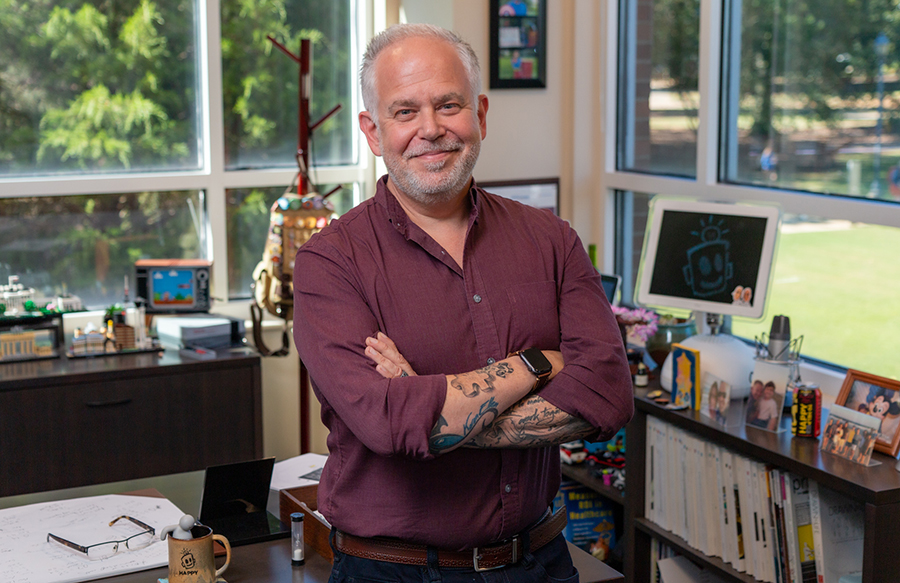 Jeff Mastromonico is the Director of Instructional Innovation for CII. Jeff is celebrating his 24th
year in higher education and his 14th year with Augusta University. Jeff has a BS
in Business Administration, an M.Ed in Educational Technology from USC, a master's
certification in gamification and game-based learning, and is currently pursuing a
doctorate in Educational Innovation. Jeff has been awarded numerous awards for his
work in the design and development of multimedia, e-learning, and game development,
including the international Serious Play award and Adobe's Golden E-Learning Award.
Jeff Mastromonico is the Director of Instructional Innovation for CII. Jeff is celebrating his 24th
year in higher education and his 14th year with Augusta University. Jeff has a BS
in Business Administration, an M.Ed in Educational Technology from USC, a master's
certification in gamification and game-based learning, and is currently pursuing a
doctorate in Educational Innovation. Jeff has been awarded numerous awards for his
work in the design and development of multimedia, e-learning, and game development,
including the international Serious Play award and Adobe's Golden E-Learning Award.